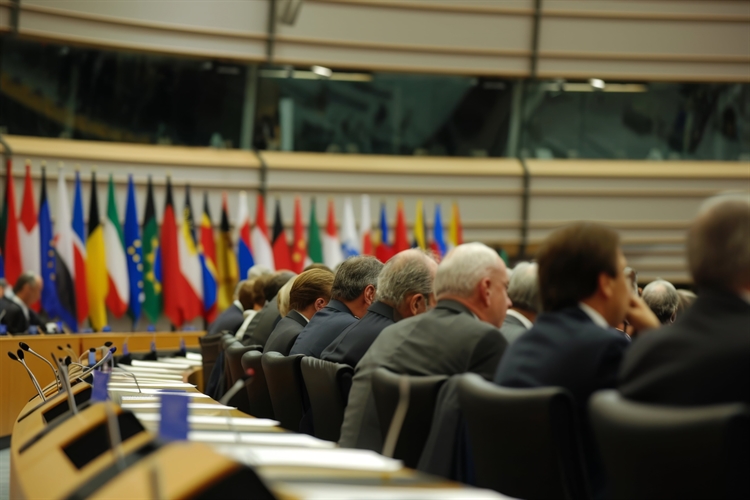Wed 12 Jun 2024
By Matthew Cocks

The European Parliament is powerful. It passes laws which bind the 450 million citizens of the European Union. Its agreement is needed for EU treaties with other countries. It agrees the EU budget and holds the European Commission to account.
Now that the elections have taken place, there is an intensive process underway within the European Parliament of forming European-level political groups. The European Parliament's rules require there to be at least 23 MEPs from at least seven EU member states in order to form a group. This is designed to ensure that the European-level groups do not simply represent national interests but the interests of EU citizens as a whole.
There were seven such groups in the previous Parliament, broadly ranging from left to right politically. In the new Parliament, there are political and tactical choices to be made on exactly where national political parties position themselves in order to form and influence the new groups. This is a crucial phase which outside observers need to follow closely.
Within the European Parliament, there is a complex system of consensus building within and between political groups. The national members of each group decide on their line to take and then aim to influence the group as a whole. However, this on its own is not enough to deliver a majority within the European Parliament. This is because, since direct voting in 1979, no individual political group has had a majority over the Parliament as a whole. The current election has not changed this. Every majority vote in the European Parliament therefore involves a coalition of more than one political group.
The composition and membership of European Parliament committees will also need to be negotiated. The committees, of which there were 20 in the previous Parliament, cover a range of subjects such as trade, environment and transport. Much of the detailed work, and some of the strategic policy choices, are made in those committees. The choice of chair for each committee is significant and should reflect the balance between political groups. Each group then chooses their coordinator in each committee. As with the chair, these are important roles. Group co-ordinators provide the members of each political group with a suggested line to take on any given proposal or amendment.
The choice of President of the European Commission then follows. The EU treaties deliberately schedule that choice to come soon after the outcome of the European Parliament elections. Indeed, the EU Member States are required to take into account the results of those elections when putting forward a candidate to be President. This has been taken in the past to mean that the leading candidate of the largest party will become President, although this is not strictly speaking a treaty obligation. What is clear is that the European Parliament elects the European Commission President on a proposal from the European Council. This connection between the elections and the President of the Commission reflects a collective wish to ensure a degree of democratic involvement in choices for senior posts.
Once elected, the President of the European Commission allocates policy portfolios to the other 26 commissioners-designate. The new European Parliament then holds a series of pre-appointment hearings with each of those commissioners in the early autumn. This is an important stage which provides the Parliament with considerable leverage. It helps ensure that candidates are suitable for the portfolios they have been given. In the past, adverse feedback from the European Parliament's committees has led to one or more commissioners-designate withdrawing their candidacy. In any case, the line of questioning taken by committees can involve commissioners-designate making promises and commitments about the direction of policy they intend to pursue. Their responses can be an important source of intelligence for future policy directions.
The treaties provide that, for most policy areas, only the European Commission can come forward with legislative proposals. This right of legislative initiative means that the Parliament must wait, in some cases for some time, before formal proposals are received from the Commission. When they are, the relevant European Parliament committee chooses an MEP to be a rapporteur to lead on the Parliament's reaction. This gives the MEP concerned considerable authority and influence. Other political groups have the option of choosing shadow rapporteurs to follow the work of the rapporteur. Meanwhile, the group coordinators marshal the opinion and votes of their colleagues. Policy differences between the Commission, Council and Parliament are often settled via trilogue meetings between the three institutions.
Now is a good time to engage with the dynamics of the new Parliament. The situation is particularly fluid at present, with newly elected MEPs arriving and political groups still forming. Ensuring that your organisation’s policy positions and concerns are communicated effectively requires both a clear understanding of the complex decision-making machinery involved and a knowledge of how individual MEPs and their teams operate within it.
If you want to gain a better understanding of how the European Parliament, Council, Commission and committees work together, get in touch to hear more about our bespoke course 'An Overview of the European Union and its Committee Procedures'. If you're looking to raise your organisation's profile with EU Institutions and political decision-makers, click here to find out more about commercial opportunities with The Parliament magazine.
View all news